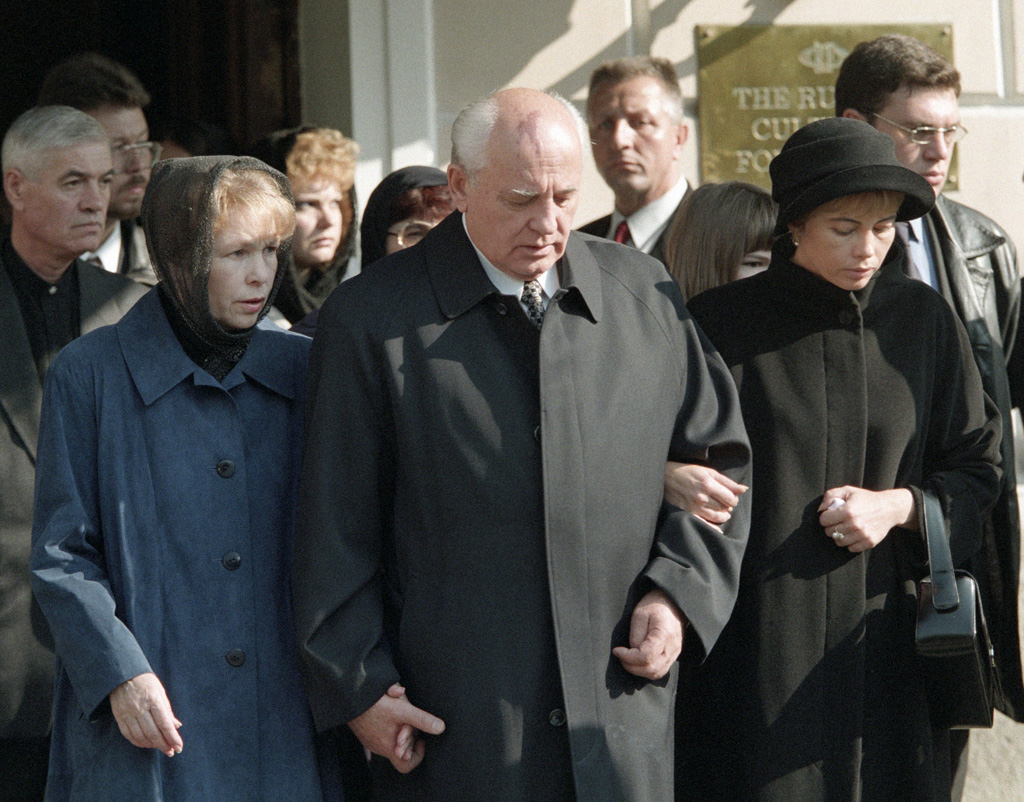

Mikhail Gorbachev (center), daughter Irina (right) and his wife's sister Lyudmila (left) at the funeral of Raisa Gorbachev. / Vladimir Rodionov / RIA Novosti archive
This is the 9th month of the year 1999. There are 99 days to go to the last year of this century. Do you feel a sense of destiny?
A BUTTERFLY flapped his wings in East Timor, setting up gentle spirals of air currents that grew as they intersected harmoniously with others nearby. He lived gloriously for a few short hours, mated, and died. Night fell and the remnants of his wings tossed and turned, no longer with life of their own, in the now strong breeze.
The stars looked down silently upon the scene. They had seen it before.
Weeks later, a hurricane carved its way across the shores of America, and two million people fled in terror from its path. Had it begun with the flapping of the butterfly's wings?
The stars looked down silently upon the scene. They had seen it before.
Do you ever stop to ask yourself about the butterflies who shape your destiny?
In October of 1952, a CIA report titled "Probable Developments in the Union of South Africa" identified the strategic importance of this country to the US primarily from our role as the largest provider of chromite, manganese and amosite asbestos. Our future role as a key provider of uranium was also identified. Militarily, South Africa's importance derived from our ports and bases were the Suez Canal to be closed.
The report recognised that the controllers of those resources were not entirely stable. Apartheid was under attack from within and without. But those within were unlikely to pay homage to Uncle Sam were they to seize the reins of power. Their allegiance lay with the Communist bloc. For this country's resources to fall into the hands of the enemy would be unthinkable.
So it was that American policy makers during the Nixon presidency under the leadership of Henry Kissinger drew up a classified battle plan code-named "The Tar Baby document". Apartheid's control of South Africa needed to be maintained by whatever means possible. Were a popular revolution to succeed in South Africa, the US would need to intervene — militarily if necessary — to restore white control. There should be no possibility of those resources falling under control of those sympathetic to the Communist agenda.
Under the Reagan administration of the 1980s, support for the anti-Communist frenzy was intensified. Funds and moral support were poured into the subcontinent for the likes of Unita in Angola and Renamo in Mozambique. The Soviets and their allies in turn poured resources into the subcontinent from Cuban forces in Angola through to financial support for the liberation movement in South Africa.
And we learnt how to kill each other and commit unimaginable atrocities — there are more amputees per capita in Angola than anywhere else in the world — and would probably have continued to do so. And I, like so many others who fled this country in the 1980s, would not be here.
Until Yuri Andropov died, and Mikhail Gorbachev became premier of the Soviet Union…
And decided he wasn't going to play any more.
The Berlin wall came down, the Soviet Union disintegrated into a commonwealth of independent states, and the US discovered it no longer had a strategic interest in the southern African subcontinent.
Denied external funding, the apartheid government and the ANC suddenly found that the debate no longer centred on who was going to win; talking to each other was now a prerequisite for survival.
So here we are…
I often wondered in the years thereafter about what drove Gorbachev. He was the most powerful man in the world — his capacity for destruction was not limited by the checks and balances built into the American political system diminishing the US president's ability to act unilaterally — yet he went through the process of deliberately dismantling the apparatus which gave him that power.
And when I saw him at his wife's deathbed wiping a tear from a face lined with grief, I understood why.
Love, Ché Guevara once said, is the centre of common endeavour. And perhaps Raisa Gorbachev was the butterfly that flapped her wings in the heart of Mikhail setting up the hurricane of destruction of the Soviet Union that led to our freedom here today.
Mikhail, I grieve with you.
